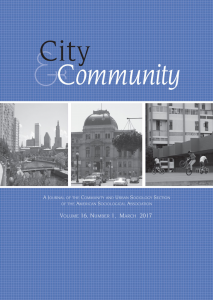Facebook Places and the Augmentation of Reality
 You probably have heard about Facebook Places, a feature that brings the site up to speed with other location-sharing services like Foursquare and Gowalla that allow users to document where they are, as well as potentially who they are with and other comments about that location.
You probably have heard about Facebook Places, a feature that brings the site up to speed with other location-sharing services like Foursquare and Gowalla that allow users to document where they are, as well as potentially who they are with and other comments about that location.
The term “augmented reality” is often used to describe the layering of digital information onto the physical world [examples of where it is now, and where it might be going]. However, I have argued that augmented reality can also refer to our digital profiles becoming increasingly implicated with the material world. If the early days of the web were about going online as anyone you wanted to be, today, our Facebook profiles are more anchored in the reality of those we know in the physical world -and now are further enmeshed with physicality given these new location-based services.
New technologies –most prominently the sensor-packed smartphone— make possible our cyborg-like lives in an increasingly augmented reality [theorist Donna Haraway is especially important here]. More than just the augmentation of our digital profiles with physical-world information, we should also think about the ways in which digital documentation impacts our everyday, offline lives. With documentation in mind, do we alter our behaviors? Is it possible that we might experience a place differently when we are documenting it using a service like Facebook Places? Might we even change what place we go to? Or asked differently, to what degree can the tail of digital documentation come to wag the dog of lived experience? ~nathanjurgenson.com




1099-0860/asset/NCB_logo.gif?v=1&s=40edfd0d901b2daf894ae7a3b2371eabd628edef)
1520-6688/asset/Capture.jpg?v=1&s=b5076c49a7d1c5f1b9cf0dd9cd292394a3be81cc)
“to what degree can the tail of digital documentation come to wag the dog of lived experience?”
I’m not sure I agree that that’s a binary…
i’m inclined to agree – can you expand on this? ~nathan
Jen–This is exactly why I am not on FaceBook and have no plans to join. Generally I stay away from social media, which limits me to (old school) email for contact and interactions.
I did hear about FaceBook Places and also heard about a rush by many users to disable the feature. What does that say about how users feel about this feature? And who might benefit from this feature?
Great post!
Keri
keri – users also rushed to remove the “news stream”, which is now the sites most popular feature. but your point is well taken, especially when these sites take a “we know what you want more than you do” stance (even if, again, they sometimes do).
regarding the “who benefits” question: first, if users are posting new and new types of info, facebook benefits. profits grow.
but, another debate around the “who benefits from internet visibility” question should be to ask how to leverage visibility to benefit the subordinated, the vulnerable, etc. so far i seem only to read how visibility harms those less powerful. but that is another post (also, see PJ Rey’s excellent posts on this topic). ~nathan
It’s like everyone gets to be famous. An important politician has to be careful about everything he does, especially about where he goes. If we can publicize our own lives to the same extent, we are bound by the same rules.
Except unlike important politicians, nobody gives a shit about what we do.
people surely give a shit about what others do online. self-presentation and socializing online is very important to many people. for many, the social networking presence is very much tied up with everyday life, and therefore is indeed of consequence. ~nathan